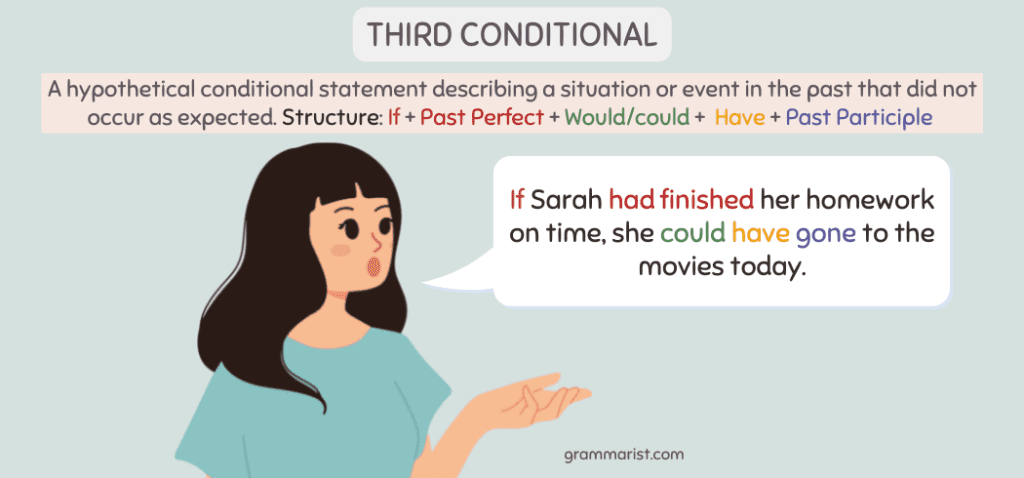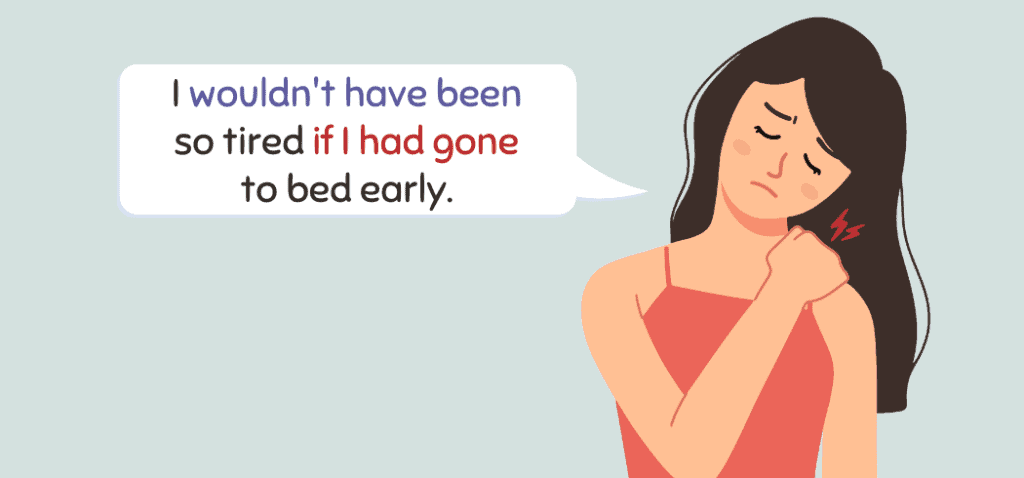The third conditional is a grammatical construction that is used to express unreal or hypothetical situations in the past. It’s tricky to master, but I use it in my writing all the time. It consists of two parts: a past tense verb and an “if” clause, followed by the result of that situation.
There are many uses for the third conditional, which can be complicated to master. This blog post will show examples of using the third conditional and a worksheet to help you practice.
What Is the Third Conditional?

The third conditional is a complex grammatical construct that describes hypothetical situations in the past or present tense. Unlike other forms of conditional, it does not refer directly to the results of specific actions but focuses on the circumstances and reactions surrounding them. For example, you could say, “If I had taken boxing lessons when I was younger, I might have been better prepared for my fight with Mike.”
What Do We Use the Third Conditional For?
The third conditional is a hypothetical conditional statement describing a situation or event in the past that did not occur as expected. In this type of sentence, I’d imagine or hypothesize about an outcome that could have happened but didn’t, using the auxiliary verbs “would” and “could” along with a past perfect verb to suggest an alternative outcome.
This type of conditional is often used when discussing potential actions that may never materialize.
For example, suppose someone had taken a different approach to a project at work. In that case, they might describe that bad outcome as caused by the third conditional.
Because the third conditional requires you to use multiple tenses and modify your language based on hindsight of outcomes, it can be somewhat challenging for English learners to master.
The Structure of a Third Conditional Sentence
I would use the past perfect in the “if clause” when making a third conditional sentence. The main clause is formed by adding a modal auxiliary plus “have” plus a past participle.
In a sentence that looks something like:
- I wouldn’t have gone shopping today if you had told me you did the groceries yesterday.
- If Sarah had finished her homework on time, she could have gone to the movies today.
Third Conditional Questions
Once you understand how to form a third conditional sentence, turning them into questions is very easy. Here are some examples:
- If you had the opportunity to study medical school, would you have become a doctor?
- If you could go back in back time, would you have done anything differently?
- Would you have helped me if I had asked for help?
- If you had been a millionaire, what would you have bought?
Third Conditional: How to Use It in Sentences

Given all this information about the third conditional, let’s look at some sample sentences that demonstrate its use in practice. First, you can express hypotheticals in the past by using phrases like “If things had only been different,” or “If things had turned out another way.”
Next, you can talk about hypothetical reactions and responses using phrases like “I wouldn’t have been surprised if…” or “It would have been natural for me to…”
Finally, you can talk about future unrealized events by saying things like “If I were able to change anything about my past…” or “I wish I could turn back time and…”
Examples of third conditional sentences:
- Jen wouldn’t have been so tired if she had gone to bed early.
- If you had studied harder, would you have passed that exam?
- If she had told me she needed help, I would have tried to help her.
Using Could Instead of Would
Could and would are two modal auxiliaries that fit into a third conditional sentence. Using could instead of would might be a little confusing for non-native English speakers, so here is a little something I use to remember.
- We use “would” to show something that will happen in an imaginary situation.
- “Could” is best suited for situations where something can happen.
- “Should” talks about something that must or ought to happen.
Difference Between the Second and Third Conditionals
The difference between these two conditionals is pretty straightforward. We use the second conditional to talk about a potential outcome, as unlikely as it may be. We use the third conditional to discuss what would have been different now if a past condition had been met.
The sentence structure is also different.
- Second conditional: If clause + past tense + main clause with an auxiliary modal verb.
- Third conditional: If clause + past perfect + modal auxiliary + have + past participle.
Here is a side-by-side example. Let’s assume Sarah, who is now a lawyer, wanted to go to med school.
- Second conditional: If Sarah went to med school, she would become a doctor.
- Third conditional: If Sarah had gone to med school, she would have become a doctor.
The Bottom Line
The third conditional is a complicated and subtle form of conditional sentence that can be difficult for English learners to understand and use correctly. It describes a present potential situation that could have happened had a past condition been met.
However, with enough practice using the third conditional accurately and effectively, you will gain confidence in your ability to discuss what could have been. I hope my guide and grammar exercises helped!